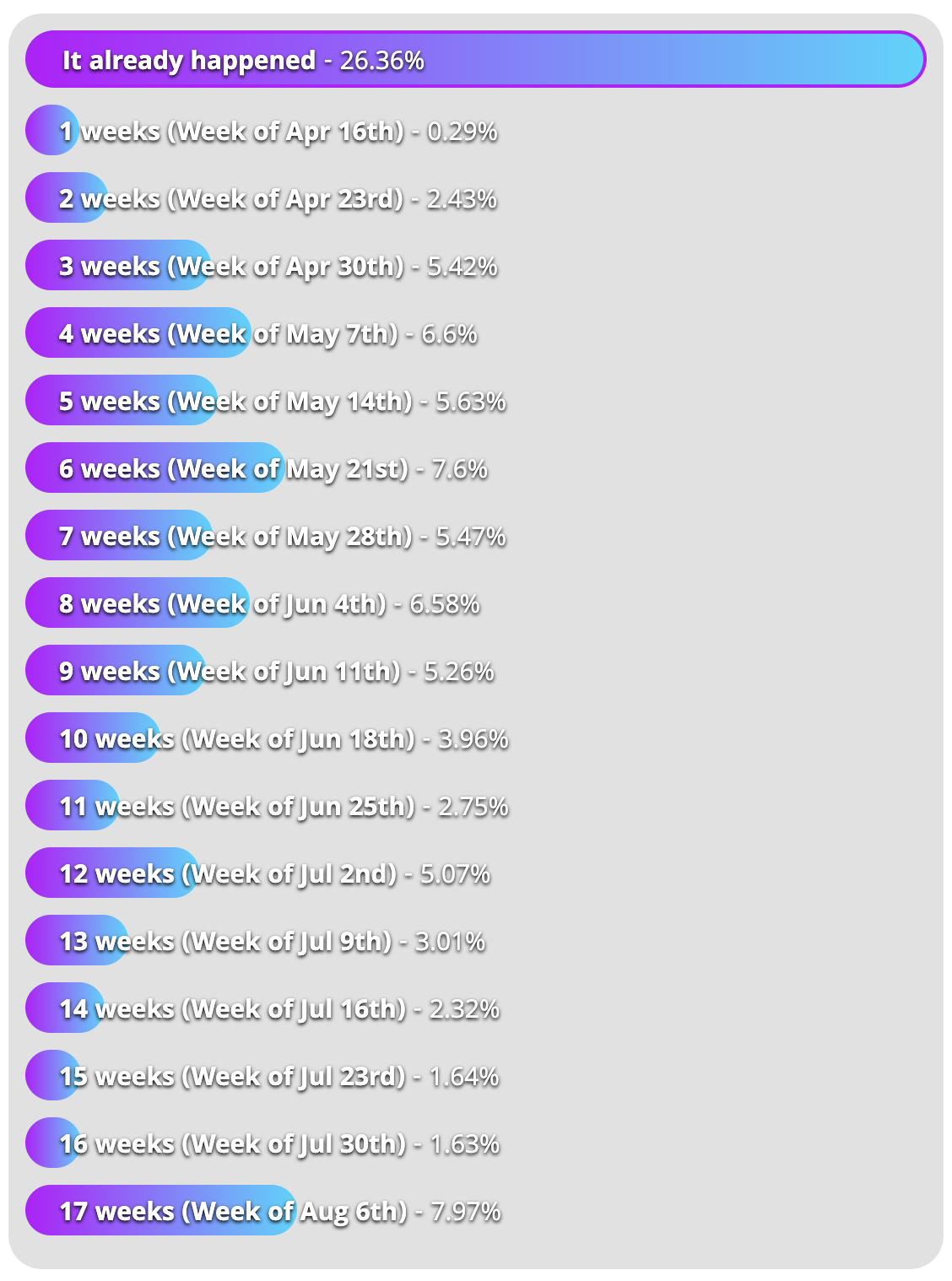
On what date will the Dow Jones Industrial Average hit its lowest point (between now & July 30, 2020)?
Five days ago, I asked our community to predict when the stock market will hit its lowest point over the next four months.
Using the FutureLoop platform, which combines both machine learning (ML) and human intelligence (HI) in a symbiotic loop, we aggregated predictions from over 7,000 participants with some fascinating results (presented below)!
>>> If you haven’t participated in the prediction poll yet, please give it a try here.
>>> To vote on the next prediction challenge, please go here.
Also, at the end of this blog, see the evidence to support crowdsourcing predictions.
(Note: If you like this blog, share it! | Facebook | Twitter | LinkedIn | Or send your friends and family to this link to subscribe!)
What were the prediction results?
Making up 7,115 voters (including 430+ financial experts), the crowd generated the following predictions:
- Approximately 26% contend the DJIA has already hit bottom (on March 22nd), while 74% predict the bottom is still ahead of us;
- On average, 5,100 users (or 74%) predict the stock market (as represented by the Dow Jones Industrial Average) will hit bottom 8.8 weeks from now—or on the week of June 8th, 2020.
- As to the male/female split, men on average think the stock market's low point will occur later than the timeframe predicted by women (8.79 weeks from now, versus 8.24 weeks).
- You can look at prediction breakdowns by industry, title and expertise here.

But what did the financial experts in the challenge predict?
In this second Prediction Challenge, a whopping 400+ Financial Experts participated, presumedly yielding a higher-accuracy prediction (according to crowd wisdom theory described below).
Only 30% of the experts believe we already hit bottom on March 22nd. The remaining 70% forecast the stock market's low point will come further down the line.
What were the primary reasons for predicting a later date? As of now, the most upvoted rationales are:
- Q2 actuals will be much worse than expected.
- We have still not seen the full impact of Covid-19.
- We will see a second wave impact: Lockdown was scary, Q2 earnings will disappoint.
How far in the future did the Financial Experts predict the bottom will hit?
Before we unlock this data point for you, we have a small request… please help us share this experimental prediction challenge via social media— the more participants, the higher the result validity.
We ask that you share this Prediction Challenge via social media just once to unlock FutureLoop expert results permanently.
What Prediction Poll should we do next?
Every week, we ask FutureLoop participants to suggest future prediction challenge questions, and we’d love your input!
Below are the top 5 current candidates. To vote on your favorite, click here!
- What percentage of the global population will contract COVID-19 over the next year (by April 1, 2021)?
- When will Disneyland (and park equivalents) be reopened to the public?
- What will be the peak U.S. unemployment rate between now and December 31, 2020?
- When will the last shelter-at-home lockdown be lifted in the U.S.?
- What do you expect the mortality rate for COVID-19 will be in the U.S. on an annual basis? (The typical mortality rate of the annual influenza in the U.S. is around 0.1%).
But why should I listen to the crowd?
The use of Artificial Intelligence to generate crowdsourced predictions is maybe the most overlooked, deceptively growing and MONUMENTAL opportunity of the next decade….
It’s a process by which a large enough group of sufficiently knowledgeable people are able to make a reasonably accurate prediction on a future outcome.
Whether in predicting election outcomes, economic trends, sports results, or even terrorist activity, crowdsourced wisdom has time and again matched or (often) outperformed expert predictions.
Starting in the early 2010s, a project sponsored by the U.S. Director of National Intelligence — the Good Judgment Project — demonstrated that 3,000 moderately informed minds could together outperform even the top foreign policy experts or CIA analysts.
According to one report, when ‘super-predictors’ (crowdsourced individuals who are correct most often) are grouped in teams, these smaller ‘crowds’ can outperform agents with access to classified information by up to 30 percent.
By anonymizing and aggregating thousands, or even millions of user-submitted predictions and justifications, FutureLoop presents these analyses to users, allowing you to question the analysis, and then update your own estimate whenever you change your mind.
Users can also vote on the reasons provided by other users for their predictions (a crowd-filtering layer that helps us understand why people lean the way they do).
These upvoted predictions and reasons, in turn, get put at the top of the heap, alerting all users of the latest crowdsourced opinions.
To join our second Crowd Prediction Poll, click here!
Join the Loop
Join FutureLoop: Over the past 2 years, I’ve built a machine learning algorithm that scrapes the world’s news, science journals and social feeds every day to understand how exponential technologies are impacting specific topics & industries. It’s called FutureLoop. I was getting ready to share it publicly, but the current crisis has changed my plans.
Last week, I launched "FutureLoop Pandemic Special Edition," a daily comprehensive update on the impact of exponential technologies (Artificial Intelligence, Robotics, Drones, Cellular Medicine, CRISPR, Networks & Sensors) on the COVID-19 pandemic.
If you participate, FutureLoop will update you every day on the latest breakthroughs in detection, prevention & cure of the COVID-19. This product is still in Beta, but it’s powerful, high-quality info, and it's free.
Your mindset is your most important tool during this pandemic. Making sure you are consuming the right information is critical to maintaining that mindset. FutureLoop offers "Data-Driven Optimism."
You can subscribe here. It’s free, fun + fast (20 seconds).
(Note: If you like this blog, share it! | Facebook | Twitter | LinkedIn | Or send your friends and family to this link to subscribe!)
Topics: Exponentials crowd the crowd wisdom of the crowd crowdsourcing exponential technology crowdsourcing genius flu influenza coronavirus pandemic infectious diseases COVID-19 virus immunity FutureLoop predictions hive mind stock market DOW DJIA Dow Jones economy stocks







